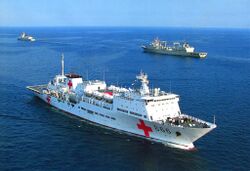Aesculapius-class hospital ship
 HS Aesculapius participating in sea trials off the coast of Nikolia
| |
| Class overview | |
|---|---|
| Name: | Aesculapius-class hospital ship |
| Builders: |
|
| Operators: |
|
| Built: | 2015-present |
| In service: | February 2016 |
| In commission: | January 2016 |
| Completed: | 9 |
| Active: | 9 |
| General characteristics | |
| Class and type: | Aesculapius-class hospital ship |
| Type: | Hospital ship |
| Displacement: | 16,000 tons |
| Length: | 180m |
| Beam: | 25m |
| Propulsion: | twin diesel engines |
| Capacity: | 500 beds |
| Crew: | ~200 crew members and around 600 medical staff |
| Aircraft carried: | Maksimov Ma-22 |
| Aviation facilities: | Stern hangar with capacity of two small helicopters or one medium size helicopter |
The Aesculapius-class hospital ship is a class of hospital ship designed and built by Maltropian shipwright, the Maritime Imperial. The class is built under a partnership agreement between Maritime Imperial and the Nikolian Ministry of Health, by which the former designs and builds the vessel and the latter sources medical equipment from Nikolian suppliers.
The first contractor was the Astyrian Federation of Red Cross Societies, which uses the vessel for humanitarian tours to developing countries and for humanitarian aid.
Design and capabilities
Facilities
The lower eight decks of the Aesculapius-class hospital ships are a modern hospital with state-of-the art medical equipment. They decks consist of 12 operating theatres, 35 Intensive Care Units and 500 beds, with the possibility of an extra fifty beds when necessary. The vessels also have a CT scanner, four X-ray machines, laboratories and an ophthalmic unit. In addition to the vessel's vast diagnostic capabilities, the physicians can consult with Nikolian medical institutes via satellite communication.
The upper decks are technical and non-medical part of the vessel. They have room for around 800 crew members, including medical staff, families, couples and individuals. There is a school for all ages up to last year of high school, a day care, a restaurant and a cafe, a library, a Gymnasium, a small supermarket and a launderette. The vessels also contain a fleet of 28 vehicles that are usually used in land-based operations, such as screening camps.
Medical and surgical care
Vessels
Commissioned
As of March 2019 there are nine vessels in active service:
- HS Aesculapius -
 AFRC
AFRC - HS Hope-
 AFRC
AFRC - HS Dr. Mihailo Petrović -
 AFRC
AFRC - HMS Princeza Ana od Istera -
 Nikolian Royal Navy
Nikolian Royal Navy - HMS Dr. Katarina Aleksić -
 Nikolian Royal Navy
Nikolian Royal Navy - HNMS Welzijn -
 Royal Noordenstaat Navy
Royal Noordenstaat Navy - HMS Resurgent -
 Aquitaynian Navy
Aquitaynian Navy - LM Dian Cécht -
 Maltropian Royal Navy
Maltropian Royal Navy - LM Miach -
 Maltropian Royal Navy
Maltropian Royal Navy